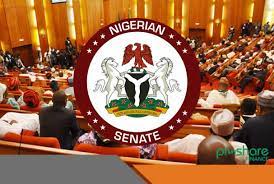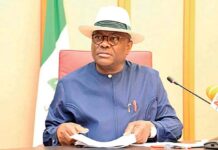A federal lawmaker Hon. Ben Igbakpa (PDP-Delta) has moved a constitutional point of order, urging the House of Representatives to over ride President Muhammadu Buhari’s veto over delay in signing section 84 (8) of the 2022 Electoral Amendment Act into law.
Igbakpa moved the motion during plenary on Wednesday in Abuja under matter of urgent national importance.
The News Agency of Nigeria (NAN) reports that the Electoral Amendment Act was recently amended by both chambers of the National Assembly, and was resent by the lawmakers after amendment of section 84 (8) for the President’s assent.
The section was to allow statutory delegates to participate in political party primaries.
The House of Reps on May 11 passed Section 84(8) of the Electoral Amendment Act, 2022 to allow statutory delegates to participate in political parties’ congresses and conventions.
NAN reports that the house amended the clause after considering a Bill sponsored by the Chairman, House Committee on Rules and Business, Rep. Abubakar Fulata.
The current version, which was assented to by the President in February, prevented statutory delegates from taking part in party primaries.
The House while on recess convened an emergency session to amend Section 84 (8) of the Electoral Act 2022.
The lawmakers, Governors, Ministers, the President, among others, could not participate during the just concluded party primaries as statutory delegates were not allowed.
This was not unconnected with the president’s refusal to sign the amended 2022 Electoral Act.
The Speaker of the House of Reps, Rep Femi Gbajabiamila, however, asked that the motion should be put on notice.
Meanwhile, the House of Representatives on Wednesday called on the Independent National Electoral Commission (INEC) to extend the deadline of the continuous voters registration by an extra 60 days from June 30, 2022, to enable Nigerians register.
The House also called on the Commission to deploy additional staff and voters registration machines across the country to meet the objective.
These resolutions followed the consideration and adoption of a motion moved by Hon. Benjamin Okezie Kalu (APC, Abia), who noted that the ongoing continuous voters registration exercise by INEC is scheduled to end on 30 June 2022, ahead of the 2023 general elections.
He noted further that the decision to suspend the voters’ registration is in line with the provisions of the Electoral Act, 2022 which requires INEC to suspend voters’ registration at least 60 days before an election.
“In April 2022, INEC declared that about 42% of the voter registrations recorded since the commencement of Continuous Voters Registration on 28 June, 2021 were invalid with about 20 million unclaimed Permanent Voters Cards (PVCs).
“Cognizant of the large numbers of unregistered eligible voters willing to be registered as evidenced by crowd seen at various registration centres resulting in congestion.
“Concerned by reports of shortages of voter registration machines, inadequate manpower and personnel at registration centres which may lead to frustrations among prospective registrants and in some cases, unrest at some registration centres.
“Also aware of calls from concerned Citizens and Civil Societies urging INEC to extend the voters’ registration deadline to accommodate eligible voters desiring to register for their Permanent Voters Cards.
“The right to vote is critically important to the health and legitimacy of our democracy, as well as electoral integrity; If nothing is done to improve the shortage of voter registration equipment and extend the deadline for voters registration, millions of Nigerians will be disenfranchised thus jeopardizing the integrity of the 2023 general elections,” the motion stated..
The House in adopting the motion mandated the Committee on Electoral Matters to engage INEC to examine and proffer solutions to the shortage of registration machines and manpower
and deploy an additional 30 voter registration machines in each local government area, train and deploy ad-hoc staff to improve the shortage of manpower at registration centers, as well as provide security for the ad-hoc staff and report back within two weeks.
























